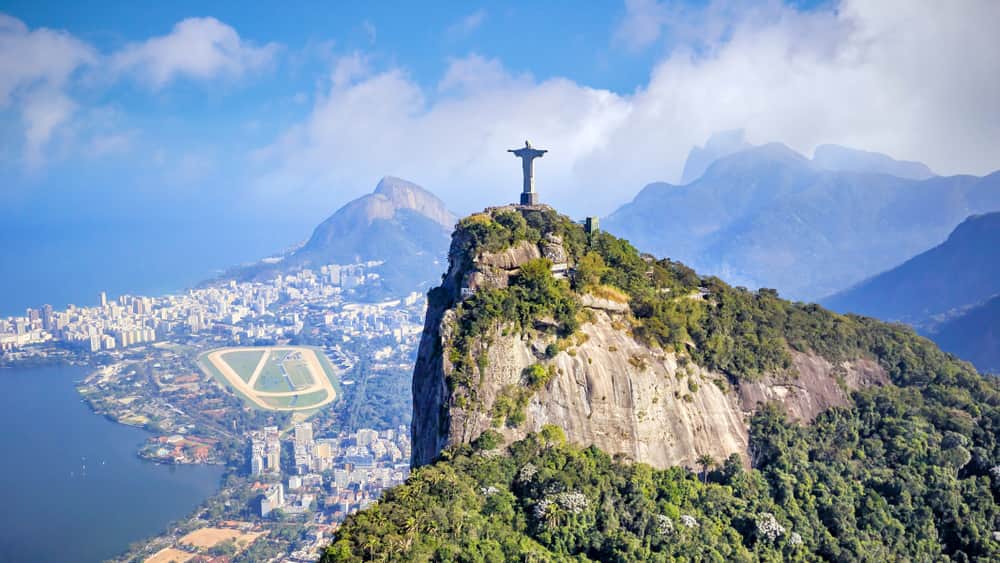How to buy a prepaid SIM card for Brazil?
Check out our in-depth guide on everything you need to know about buying a prepaid Brazil SIM card, including different providers, pricing, and features.

Are you considering travelling to Brazil? It’s the world’s fifth largest country and it’s jam packed with culture, cuisine, and charm. From vibrant cities, white sand beaches and the tropical rainforests, Brazil has a little something for everyone. However, because of all of its biodiversity, it's important that you learn if you need to get any shots or vaccines before you visit so you can stay healthy on your trip. Read on to find out what you can do to prepare yourself before you leave.
Immunisations, shots, and vaccinations are related, but they're three different things. Immunisation is the overall process of making your body - your immune system - resilient to a disease or a virus. Shots, or an injection, is one way of immunising yourself. You usually get a shot at a doctor’s office or pharmacy. The shot contains a substance called a vaccination. This vaccination usually contains elements that stimulate your immune system so that your body recognises and becomes resilient to the disease or virus in the future. The immunisation process for different diseases or viruses varies. Some vaccines are administered at different points in your life and some require more than one shot. For example, the flu shot is administered annually, while a tetanus shot and booster are recommended every ten years.
When you travel your body is exposed to different biological elements. Sometimes these are elements that you may never have experienced before, especially if you haven’t travelled to that country or region of the world. These new elements - coupled with the stress of travelling on planes, trains and automobiles - could potentially weaken your immune system and leave you vulnerable to falling ill or contracting a dangerous disease. This is why getting vaccinated before you travel is extremely important.
With the increased effectiveness of vaccines around the world in the past 100 years, governments started recommending - and even mandating at times - that citizens and visitors get certain vaccines before travelling. Even though it’s a personal measure, it’s in the best interest for the greater good. Large numbers of people being vaccinated has helped control the spread of, and even eradicated, some infectious diseases. For example, smallpox was a disease that plagued Europe in the late 1800s but in 1980 the World Health Organisation officially declared it obsolete due to effective vaccination worldwide.
Brazil is a high risk area for the Zika virus, which is carried by mosquitoes and can potentially cause severe birth defects. The Center for Disease Control (CDC) warns that pregnant women or women who are considering getting pregnant avoid travel to Brazil or at least consult with their doctors or research the risks before travelling to Brazil. There’s no vaccine for Zika, but preventative measures can be taken to avoid getting mosquito bites and transferring the virus through sexual contact.
There’s also a current outbreak of yellow fever in several areas in Brazil. At first, cases were limited to Minas Gerais, but confirmed reports of cases have now spread to other neighbouring states. At its most extreme, this disease can be fatal, and deaths have been reported. Health authorities recommend that travellers who are 9 months or older going to the Brazilian states of Minas Gerais, Espírito Santo, São Paulo, Rio de Janeiro, and parts of Bahia get the yellow fever vaccine or booster.
It’s recommended that you check with your doctor about six weeks before you travel to ensure that all of your routine vaccinations are up-to-date. Depending on the disease, the full immunisation process may require more than one round of receiving the vaccination. This could mean multiple shots over a longer period, so make sure you give yourself enough time before departure.
The CDC warns that travellers should contact a yellow fever vaccine provider well in advance of travel because there’s a shortage of yellow fever vaccine in some areas.This is important when going to Brazil due to recent yellow fever outbreaks.
While no vaccinations are required for short-term visitors, here is a list of vaccines and shots that are recommended before travelling to Brazil:
| Disease/vaccine | Vaccine required? | Recommended For... | Reason |
|---|---|---|---|
| Measles - mumps - rubella (MMR) | No | All travellers | This is a routine vaccination that should be done before travelling to any country. |
| Diphtheria - tetanus - pertussis vaccine | No | All travellers | This is a routine vaccination that should be done before travelling to any country. |
| Varicella (chickenpox) vaccine | No | All travellers | This is a routine vaccination that should be done before travelling to any country. |
| Polio vaccine | No | All travellers | This is a routine vaccination that should be done before travelling to any country. |
| Flu shot | No | All travellers | This is a routine vaccination that should be done before travelling to any country. |
| Hepatitis A | No | Most travellers | Hepatitis A can be contracted through contaminated food or water in Brazil. |
| Malaria | No | Some travellers | There’s a risk of contracting malaria through mosquito bites in Brazil. Travellers should take precaution not to get bitten by mosquitoes while in Brazil. |
| Yellow fever | Yes, for people arriving from Angola or the Democratic People’s Republic of Congo | All travellers over the age of 9 months going to areas in Brazil currently experiencing an outbreak, including the states of Minas Gerais, Espirito Santo, Sao Paulo, Rio de Janeiro, and parts of Bahia | Yellow fever can be contracted through mosquito bites. Travellers should take preventative measures not to get bitten by mosquitos. |
| Rabies | No | Travellers involved in outdoor and other activities or those working closely with animals | Rabies can be found in several animals in Brazil such as dogs, bats and other mammals. |
| Hepatitis B | No | Travellers who might have sex with a new partner or have any procedures involving needles | Hepatitis B can be contracted through sexual contact with someone who has it, or by using contaminated needles and blood products. |
A lot of the high-risk diseases and viruses in Brazil are contracted through mosquito bites. Brazil is known as the ‘epicenter of the Zika outbreak’ according to the World Health Organisation. Mosquitoes carrying the Zika virus like warm weather, moisture, and heavy rain. Thus, travellers may want to avoid the summer rainy season in Brazil between November and May. To lower your risk of getting bitten, wear long sleeves and use bug spray with lots of DEET (even though it’s not great for the environment).
Brazilian cities are usually well equipped to deal with medical emergencies, but if you’re in the country, you may have to plan to travel quite a way to find treatment. If you have an emergency in Brazil you can always dial the police on 190. For an ambulance you can dial 192. Travellers can also contact consular agencies from their own countries, including:
Beautiful and vibrant Brazil is a popular destination for many international tourists. If you’re planning to visit, you should prepare by researching the recommended vaccinations that you might want before you go. Since you aren’t actually required to vaccinate yourself, you’ll have to use your best judgment to decide what to do. You can use this guide to help you understand how to stay safe and healthy on your trip.
*Please see terms of use and product availability for your region or visit Wise fees and pricing for the most up to date pricing and fee information.
This publication is provided for general information purposes and does not constitute legal, tax or other professional advice from Wise Payments Limited or its subsidiaries and its affiliates, and it is not intended as a substitute for obtaining advice from a financial advisor or any other professional.
We make no representations, warranties or guarantees, whether expressed or implied, that the content in the publication is accurate, complete or up to date.

Check out our in-depth guide on everything you need to know about buying a prepaid Brazil SIM card, including different providers, pricing, and features.

Check out our handy guide to using PayPal in Brazil, including what fees you can expect.

A handy guide on how Revolut works in Brazil, including info for UK customers on using a Revolut card abroad.

Read our essential guide to ATMs in Brazil, including how to find them, fees, exchange rates, withdrawal limits and more.

Brazil has a lot to offer visitors. Since hosting the Football World Cup in 2014 and the Olympics in 2016, travellers from all over the world have arrived,...